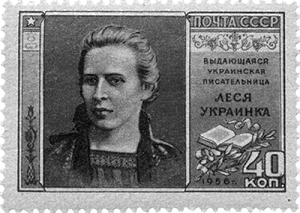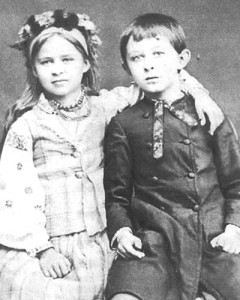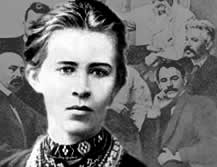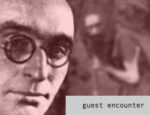Description
 Meet the activist, classicist and founding mother of Ukrainian literature, Larysa Kosach, known under the nationalist pseudonym of Lesya Ukrainka. She was in a dangerous position since publishing in her mother tongue was banned by the Russian Empire. As an active opponent of the Tsarist regime, and a Marxist, she was alienated from the prevailing political order; she had been affected, at the age of 9, by the arrest and five-year Siberian exile of her aunt Olena Kosach in a wave of persecution of political activists in St. Petersburg. Profoundly shocked, the little girl was motivated to write her first poem, and many of her later works continued to address political theme. One of the texts she later illegally translated into Ukrainian was the Communist Manifesto (1902). Ukrainka was herself arrested, although briefly, in 1907, when suffering bitter disappointment at the failure of the 1905 Russian revolution.
Meet the activist, classicist and founding mother of Ukrainian literature, Larysa Kosach, known under the nationalist pseudonym of Lesya Ukrainka. She was in a dangerous position since publishing in her mother tongue was banned by the Russian Empire. As an active opponent of the Tsarist regime, and a Marxist, she was alienated from the prevailing political order; she had been affected, at the age of 9, by the arrest and five-year Siberian exile of her aunt Olena Kosach in a wave of persecution of political activists in St. Petersburg. Profoundly shocked, the little girl was motivated to write her first poem, and many of her later works continued to address political theme. One of the texts she later illegally translated into Ukrainian was the Communist Manifesto (1902). Ukrainka was herself arrested, although briefly, in 1907, when suffering bitter disappointment at the failure of the 1905 Russian revolution.
 Her avant-garde parents had educated her at home, along with her brother Mykhaylo, in Greek and Latin as well as modern European languages. Her favourite reading included Homer and Ovid (both of whom she translated), Sappho (about whom she wrote a poem), and the Greek tragedians. With Mykhaylo and other children, she had organised stagings of both the Iliad and the Odyssey. In adulthood she remained deeply attached to him, and they shared the political and artistic project of translating great works of literature into Ukrainian. In her own work, the voices of ancient Greek heroines gave her a medium for political polemic. She was ‘especially moved’ by the heroine of the Sophoclean Antigone, and in her play On the Ruins she tried to inspire workers and fellow countrymen to great deeds of self-sacrifice through the words of the prophetess Tirsa, who exhorts her fellow Jews to liberate themselves from Babylonian captivity. This strategy is similar to the uses to which she put the Trojan prophetess in her Cassandra. Ukrainka’s play Iphigenia in Tauris, set in the Ukrainian Crimea, also incorporates the myth of Prometheus, a political hero to whom she had been introduced by her uncle Mykhaylo Drahomaniv in Bulgarian exile. Formerly a Professor of Literature at the University of Kiev, he had lost his job because of accusations of disloyalty to the Tsarist regime.
Her avant-garde parents had educated her at home, along with her brother Mykhaylo, in Greek and Latin as well as modern European languages. Her favourite reading included Homer and Ovid (both of whom she translated), Sappho (about whom she wrote a poem), and the Greek tragedians. With Mykhaylo and other children, she had organised stagings of both the Iliad and the Odyssey. In adulthood she remained deeply attached to him, and they shared the political and artistic project of translating great works of literature into Ukrainian. In her own work, the voices of ancient Greek heroines gave her a medium for political polemic. She was ‘especially moved’ by the heroine of the Sophoclean Antigone, and in her play On the Ruins she tried to inspire workers and fellow countrymen to great deeds of self-sacrifice through the words of the prophetess Tirsa, who exhorts her fellow Jews to liberate themselves from Babylonian captivity. This strategy is similar to the uses to which she put the Trojan prophetess in her Cassandra. Ukrainka’s play Iphigenia in Tauris, set in the Ukrainian Crimea, also incorporates the myth of Prometheus, a political hero to whom she had been introduced by her uncle Mykhaylo Drahomaniv in Bulgarian exile. Formerly a Professor of Literature at the University of Kiev, he had lost his job because of accusations of disloyalty to the Tsarist regime.
n.b. around 1900




